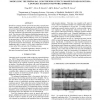Free Online Productivity Tools
i2Speak
i2Symbol
i2OCR
iTex2Img
iWeb2Print
iWeb2Shot
i2Type
iPdf2Split
iPdf2Merge
i2Bopomofo
i2Arabic
i2Style
i2Image
i2PDF
iLatex2Rtf
Sci2ools
ICASSP
2009
IEEE
2009
IEEE
Modelling the prepausal lengthening effect for speech recognition: a dynamic Bayesian network approach
Speech has a property that the speech unit preceding a speech pause tends to lengthen. This work presents the use of a dynamic Bayesian network to model the prepausal lengthening effect for robust speech recognition. Specifically, we introduce two distributions to model inter-state transitions in prepausal and non-prepausal words, respectively. The selection of the transition distributions depends on a random variable whose value is influenced by whether a pause will appear between the current and the following word. Two experiments are presented here. The first one considers pauses hypothesised during speech decoding. The second one employs an extra component for speech/non-speech determination. By modelling the prepausal lengthening effect we achieve a 5.5% relative reduction in word error rate on the 500-word task of the SVitchboard corpus.
ICASSP 2009 | Prepausal Lengthening Effect | Robust Speech Recognition | Signal Processing | Speech Pause |
| Added | 21 May 2010 |
| Updated | 21 May 2010 |
| Type | Conference |
| Year | 2009 |
| Where | ICASSP |
| Authors | Ning Ma, Chris Bartels, Jeff A. Bilmes, Phil Green |
Comments (0)

